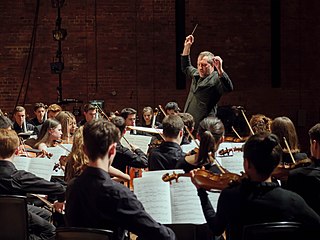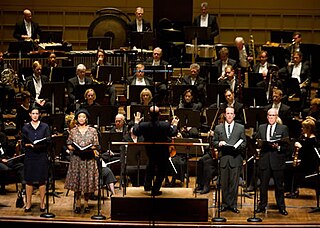Related Research Articles

A concerto is, from the late Baroque era, mostly understood as an instrumental composition, written for one or more soloists accompanied by an orchestra or other ensemble. The typical three-movement structure, a slow movement preceded and followed by fast movements, became a standard from the early 18th century.

A string orchestra is an orchestra consisting solely of a string section made up of the bowed strings used in Western Classical music. The instruments of such an orchestra are most often the following: the violin, which is divided into first and second violin players, the viola, the cello, and usually, but not always, the double bass.
Richard Gilford Adeney was a British flautist who played principal flute with the London Philharmonic Orchestra and the English Chamber Orchestra, was a soloist and a founding member of the Melos Ensemble.

Charles Peter Wuorinen was a Pulitzer Prize-winning American composer of contemporary classical music based in New York City. He performed his works and other 20th-century music as pianist and conductor.
The Gramophone Classical Music Awards, launched in 1977, are one of the most significant honours bestowed on recordings in the classical record industry. They are often viewed as equivalent to or surpassing the American Grammy award, and referred to as the Oscars for classical music. They are widely regarded as the most influential and prestigious classical music awards in the world. According to Matthew Owen, national sales manager for Harmonia Mundi USA, "ultimately it is the classical award, especially worldwide."

Thomas Adès is a British composer, pianist and conductor. Five compositions by Adès received votes in the 2017 Classic Voice poll of the greatest works of art music since 2000: The Tempest (2004), Violin Concerto (2005), Tevot (2007), In Seven Days (2008), and Polaris (2010).

Murray David Perahia, KBE is an American pianist and conductor. He is widely considered as one of the greatest living pianists. He was the first North American pianist to win the Leeds International Piano Competition, in 1972. Known as a leading interpreter of Bach, Handel, Scarlatti, Mozart, Beethoven, and Schumann, among other composers, Perahia has won numerous awards, including three Grammy Awards from a total of 18 nominations, and 9 Gramophone Awards in addition to its first and only "Piano Award".

Steven Edward Stucky was a Pulitzer Prize-winning American composer.
Judith Weir is a British composer and the first female Master of the Queen's Music.

Robin Greville Holloway is an English composer, academic and writer.
Christian Tetzlaff is a German violinist.
The Melos Ensemble is a group of musicians who started in 1950 in London to play chamber music in mixed instrumentation of string instruments, wind instruments and others. The ensemble's reputation for excellence has encouraged composers to write music exploring these resources. Benjamin Britten composed the chamber music for his War Requiem for the Melos Ensemble and conducted the group in the first performance in Coventry.
Robert Duncan Druce was an English composer, string player and musicologist, noted for his breadth of musical interests ranging from contemporary music to baroque and early music, as well as music of India.
The Flute Concerto is a composition for solo flute and orchestra by the American composer Elliott Carter. The work was commissioned by Elena Bashkirova for the Jerusalem International Chamber Music. Carter began the composition in September 2007 and completed it in March 2008 at the age of 99. The piece was first performed at the Jerusalem International YMCA on September 9, 2008 by the flutist Emmanuel Pahud and the Jerusalem International Chamber Music Ensemble under the conductor Daniel Barenboim.
The Asko Concerto is a concerto for chamber orchestra by the American composer Elliott Carter. The work was commissioned by the Dutch chamber group Asko Ensemble, for which the piece is titled. It was composed in January 2000 and was first performed in Concertgebouw, Amsterdam on April 26, 2000, by the Asko ensemble under the conductor Oliver Knussen. The piece is dedicated to Asko/Schönberg.
Souvenir is a composition for chamber orchestra by the Finnish composer Magnus Lindberg. The work was commissioned by the New York Philharmonic, for which Lindberg was then composer-in-residence. It was given its world premiere on November 19, 2010 at Symphony Space, New York City, by the New York Philharmonic under the direction of Alan Gilbert. The piece was written in memoriam for Lindberg's friend and fellow composer Gérard Grisey.
The Cello Concerto No. 1 is a composition for solo cello and orchestra by the Finnish composer Magnus Lindberg. It was first performed in the Cité de la Musique, Paris on May 6, 1999 by the cellist Anssi Karttunen and the Orchestre de Paris under the direction of Esa-Pekka Salonen.
Kraft is a composition for solo ensemble, electronics, and orchestra by the Finnish composer Magnus Lindberg. The work was commissioned by the Helsinki Festival and was first performed on September 4, 1985 by the Toimii ensemble and the Finnish Radio Symphony Orchestra under the direction of Esa-Pekka Salonen. The piece was awarded the International Rostrum of Composers in 1986 and won the Nordic Council Music Prize in 1988.
The Concerto for Piano and Orchestra is the first piano concerto by the Finnish composer Magnus Lindberg. The work was commissioned by the Helsinki Festival on September 4, 1991 and completed in 1994. It is dedicated to the pianist Paul Crossley.
Al largo is a composition for orchestra by the Finnish composer Magnus Lindberg. It was commissioned by the New York Philharmonic while Lindberg served as the orchestra's composer-in-residence. Its world premiere was given by the New York Philharmonic under the direction of Alan Gilbert at Avery Fisher Hall on June 23, 2010.
References
- 1 2 Weir, Judith (1997). "Piano Concerto". Chester Music . Retrieved 16 July 2020.
- ↑ Service, Tom (28 May 2012). "A guide to Judith Weir's music". The Guardian . Retrieved 16 July 2020.
- ↑ Tommasini, Anthony (5 March 2006). "Classical Recordings; That's Maestro Tolstoy, if You Please". The New York Times . Retrieved 16 July 2020.
- ↑ Whittall, Arnold (August 2006). "Weir Consolations of Scholarship; Piano Concerto; King Harald's Saga". Gramophone . Retrieved 16 July 2020.